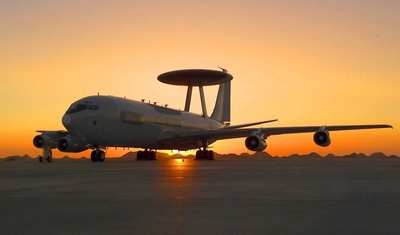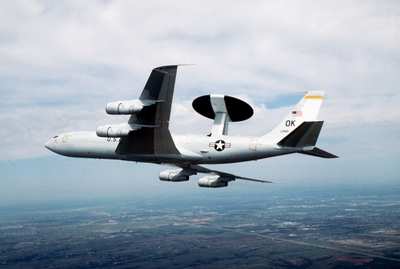Sun, Sep 14, 2008
Boeing tells ANN that it has completed mission system
flight testing for Block 40/45, the largest upgrade in the history
of the U.S. E-3 Airborne Warning and Control System (AWACS) fleet.
During a 15-month period from April 2007 to July 2008, Boeing and
the Air Force's Joint Test Force flew missions aboard Test System
3, an AWACS test aircraft, to complete the System Design and
Development program.

"Test data indicate the Block 40/45 system meets or exceeds all
its key performance parameters and technical performance
requirements," said Stu Oliason, 40/45 System Design and
Development program manager for Boeing.
"The success of this flight-test program is a tribute to the
hard work and dedication of hundreds of 40/45 employees. We're all
very excited about bringing this new capability to the warfighter,"
Oliason added.
Under the Block 40/45 program, the aircraft's legacy mainframe
computer has been replaced with an open system architecture using
network servers in a user-friendly operating environment. The
vastly improved computing power helps automate what is currently a
manually intensive workload for the AWACS operators.
A multisource integration capability automates the process of
detecting and identifying targets to provide a
single-target/single-track resolution. Outgoing tasking messages
are automatically prioritized via a data link infrastructure.
Features are displayed to operators on the Primary AWACS Display in
a user-friendly, intuitive manner. The numerous buttons and
switches around the current operator console have been replaced
with point-and-click simplicity and a display featuring drop-down
menus and rapid access to all required information. This
functionality shortens the time required to execute either combat
or search-and-rescue missions.

The cumulative benefit of the Block 40/45 upgrade is to increase
overall mission effectiveness for AWACS operators in the
21st-century battlespace, while boosting the reliability of the
mission system and lowering life-cycle costs. The baseline
capability is designed to allow future upgrades.
The Air Force is expected to make a decision on the next step --
a Block 40/45 production contract -- by the end of this year.
More News
He Attempted To Restart The Engine Three Times. On The Third Restart Attempt, He Noticed That Flames Were Coming Out From The Right Wing Near The Fuel Cap Analysis: The pilot repor>[...]
Make Sure You NEVER Miss A New Story From Aero-News Network Do you ever feel like you never see posts from a certain person or page on Facebook or Instagram? Here’s how you c>[...]
From 2009 (YouTube Edition): Leading Air Show Performers Give Their Best Advice for Newcomers On December 6th through December 9th, the Paris Las Vegas Hotel hosted over 1,500 air >[...]
Aero Linx: NASA ASRS ASRS captures confidential reports, analyzes the resulting aviation safety data, and disseminates vital information to the aviation community. The ASRS is an i>[...]
“For our inaugural Pylon Racing Seminar in Roswell, we were thrilled to certify 60 pilots across our six closed-course pylon race classes. Not only did this year’s PRS >[...]
 NTSB Final Report: Rutan Long-EZ
NTSB Final Report: Rutan Long-EZ ANN FAQ: Turn On Post Notifications
ANN FAQ: Turn On Post Notifications Classic Aero-TV: ICAS Perspectives - Advice for New Air Show Performers
Classic Aero-TV: ICAS Perspectives - Advice for New Air Show Performers ANN's Daily Aero-Linx (06.28.25)
ANN's Daily Aero-Linx (06.28.25) Aero-News: Quote of the Day (06.28.25)
Aero-News: Quote of the Day (06.28.25)




